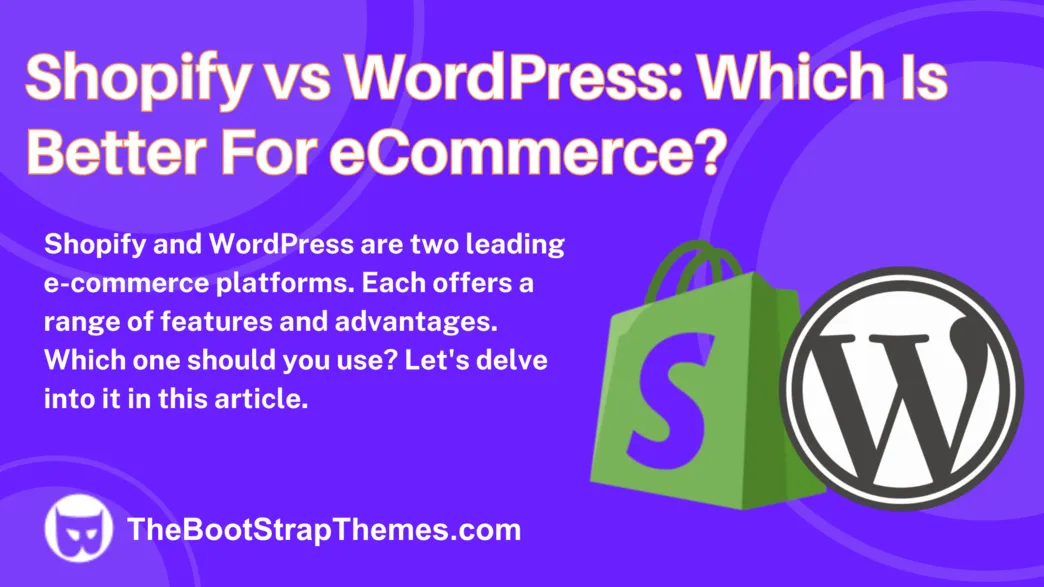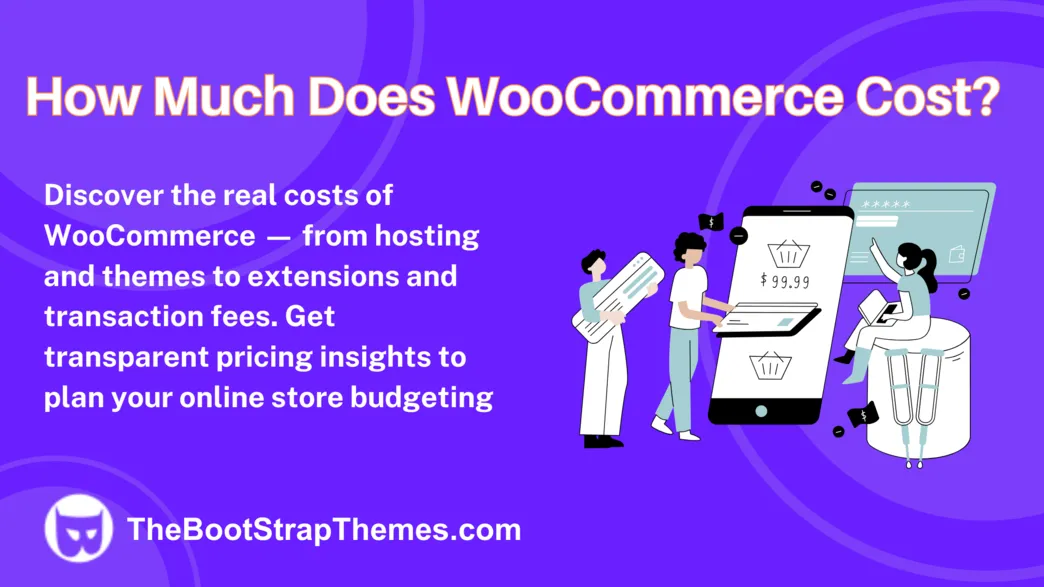Are you thinking about starting a store or upgrading an existing one? With so many choices available, it can be tough to figure out which platform is right for your business.
You might have come across two popular eCommerce platforms: WordPress and Shopify. Their popularity and features may confuse you about which one to choose.
No need to worry! This article will closely compare Shopify vs WordPress, highlighting their differences and features to help you make a decision.
What is Shopify?
Shopify serves as an eCommerce platform that allows you to create your own personalized store. It operates on the cloud, meaning that managing your store becomes effortless as long as you have internet access and a web browser.
Shopify is specifically designed to assist merchants in launching their eCommerce stores and supporting the sale of goods.
Shopify provides a range of features, including managing product catalogs, secure payment processing, marketing tools, and analytics. These features help businesses effectively reach their target audience.
Online sellers in over 175 countries are using Shopify, and 4.5 million e-commerce sites are built with Shopify.
What is WordPress?
On the other hand, WordPress is a widely used content management system (CMS). It has gained popularity for its user interface and its ability to function as an e-commerce platform. With its WooCommerce plugin, WordPress allows businesses to easily establish and manage online stores.
WooCommerce has some unique features, such as product listings, secure payment processing, inventory management, and customizable themes. Additionally, WordPress allows for customization that caters to all types of users looking to create an impactful online presence.
Notably, WordPress is the most used CMS globally, powering 43.3% of all websites on the internet. Over 500 sites are built using WordPress each day.
Let’s look at the comparison of Shopify and WordPress for e-commerce.
1. Shopify vs WordPress for eCommerce – Templates

Shopify
Shopify provides a selection of designed templates for various industries and niches. These templates are well known for their user-friendly nature, making it simple for individuals with web design experience to easily create attractive online stores.
Shopify templates are designed to be mobile-responsive, ensuring a shopping experience across devices. Moreover, these templates prioritize speed and security, which are driving factors in the field of eCommerce.

WordPress
One of the standout features of WordPress is its versatility and adaptability when it comes to templates, which greatly contributes to its popularity.
With the WooCommerce plugin, WordPress offers a range of template options, including both premium and free. This makes it an excellent choice for tech users and businesses who desire control over the design and functionality of their stores.
2. Ease of use

Shopify
Shopify’s user interface makes it incredibly easy to use. It is an option for individuals and businesses venturing into eCommerce at the time. Shopify provides a hassle-free solution that allows users to quickly set up their stores without needing technical knowledge.

WordPress
In contrast, while using WordPress itself is generally straightforward, configuring and managing the WooCommerce plugin may require some level of familiarity. However, adding products and managing orders become more intuitive once the plugin is installed.
Also, WordPress stands out for its ability to create and manage website content.
3. Customization

Shopify
Shopify is an option for beginners or businesses seeking a setup thanks to its user-friendly approach to customization.
Its strength lies in its simplicity and design-focused features, allowing for an e-commerce experience without the need for coding or technical expertise.

WordPress
WordPress offers customization capabilities through custom themes and plugins.
Although it provides customization options, using WordPress requires technical proficiency. It is a good choice for those looking to create tailor-made e-commerce sites.
4. Pricing

Shopify
When it comes to pricing, Shopify offers rates considering the features, security, and scalability it provides. Users can explore the platform during a 14-day trial before committing to paid plans.
The Basic Shopify plan starts at $32 per month, but there are additional costs for plugins, themes and integrations, so the total costs can quickly rise to 50+ USD/month. However, the Advanced Shopify plan caters to high-growth businesses with advanced capabilities and is available at $399 per month.

WordPress
On the other hand, WordPress itself is free to use. However, additional expenses may arise from plugins, themes, and managed WordPress hosting, which handles technical aspects like security, backups, and performance optimization, typically costing $10–$50+ per month.
5. Scalability
When it comes to scalability, choosing a platform for your business expansion is essential. Both Shopify and WordPress are known for their scalability.

Shopify
Shopify is widely acknowledged for its scalability, effortlessly accommodating businesses of all sizes.
With its cloud-based infrastructure, Shopify can handle increased traffic orders and product listings as your business grows.
Moreover, the platform provides a variety of apps and integrations that enable you to incorporate functionalities and features as your business expands.

WordPress
WordPress offers options for scalability and customization so that you have control over your website’s growth along with your business.
You can enhance your hosting infrastructure using content delivery networks (CDNs). Optimize performance based on your needs.
However, achieving this level of scalability may require expertise or external assistance. Thus, WooCommerce proves effective for small- and medium-sized businesses but is not best for high-traffic e-commerce businesses.
6. SEO and Content

Shopify
Shopify offers SEO capabilities with title tags, meta descriptions, and alt text for images.
It provides a codebase that’s mobile-responsive, contributing to its SEO friendliness.
Additionally, Shopify’s speed and security features, like SSL certificates, have an impact on search engine rankings.

WordPress
WordPress offers SEO options with plugins like Yoast, MonsterInsights, Rank Math, Premium SEO Pack, and WP Meta SEO.
These plugins provide an SEO analysis of your content, offering step-by-step guidance on improving your website’s ranking and creating SEO-optimized sitemaps for your WordPress site.
WordPress is also known for its ability to create user-friendly website URLs that are easy for visitors to understand and navigate.
7. Customer support and Guidance

Shopify
Shopify is highly regarded for its customer support and assistance. They offer 24/7 support through chat, email, and phone channels.
Additionally, Shopify provides a variety of resources, such as forums and tutorials, making it simple for users to find solutions.
They also have a network of experts and affiliates to help users throughout their e-commerce journey.

WordPress
In contrast to Shopify’s customer support, WordPress relies on its online community for support and guidance.
Although it lacks 24/7 assistance, it compensates by offering a wealth of resources. Users can access forums, blogs, and the comprehensive documentation provided by WordPress.org for troubleshooting and learning purposes.
Moreover, hosting providers and theme developers offer premium support options.
8. eCommerce and Selling tools

Shopify
Shopify stands out as an eCommerce platform that offers a suite of selling tools. It ensures an enjoyable experience for setting up and managing a store.
Its features include payment processing, a user-friendly inventory system, order tracking, and the ability to recover abandoned shopping carts for an effective product development strategy.
However, Shopify lacks the open-source concept, so the flexibility to offer customized features is somehow limited.

WordPress
With its robust e-commerce and selling tools combined with flexibility, WordPress is a powerful choice.
WooCommerce empowers users to create online stores with features like product listings, payment processing, and inventory management.
The versatility of WordPress allows it to cater to content websites, and e-commerce simultaneously.
Conclusion
For your e-commerce platform, deciding between Shopify vs WordPress ultimately depends on your business needs and technical expertise.
If you prioritize a hassle-free, user-friendly, and more centralized experience, Shopify stands out with its straightforward setup process and dedicated support.
However, if you are looking for a high level of customization with seamless content integration and lower costs, WordPress with WooCommerce is an excellent option.




